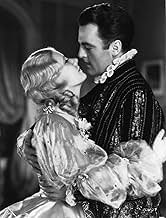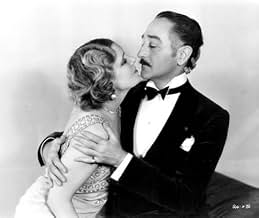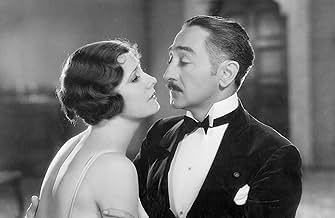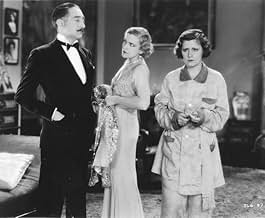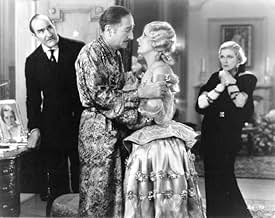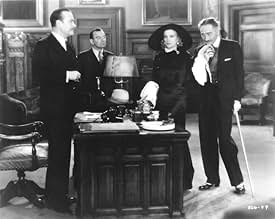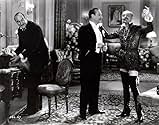Agrega una trama en tu idiomaJean Paurel is a womanizing opera star, who agrees to help Diana Page her career in order to take advantage of her. But instead he finds falling in love with her. To complicate matters, Jean... Leer todoJean Paurel is a womanizing opera star, who agrees to help Diana Page her career in order to take advantage of her. But instead he finds falling in love with her. To complicate matters, Jean's understudy turns out to be Diana's old flame, and tries to rekindle their relationship.Jean Paurel is a womanizing opera star, who agrees to help Diana Page her career in order to take advantage of her. But instead he finds falling in love with her. To complicate matters, Jean's understudy turns out to be Diana's old flame, and tries to rekindle their relationship.
- Dirección
- Guionistas
- Elenco
- Premios
- 2 premios ganados en total
- Mme. Savarova
- (as Baclanova)
- Rosco
- (as Rosco Ates)
- Mme. Neumann Baumbach
- (as Else Janssen)
- Mrs. Loring
- (sin créditos)
- Blonde Autograph Seeker
- (sin créditos)
- Opera Attendee in Box
- (sin créditos)
- Stapleton's Secretary
- (sin créditos)
- Diana's Dockside Boyfriend
- (sin créditos)
Opiniones destacadas
"The Great Lover" stars Adolphe Menjou as Jean Paurel,an operatic baritone who loves women. Diana Page (Irene Dunne) idolizes him and wants to study with him, and he takes her on, with the objective of taking advantage of her. Meanwhile, another baritone is in love with her (Neil Hamilton, who became the commissioner on the TV show Batman), and she is resisting him.
Paurel finds himself falling for this young woman and becoming engaged to her. When Paurel loses his voice one night, his understudy is Diane's ex-boyfriend. What will happen? Does Diane truly love Paurel, or is she just bewitched by what he can do for her?
This isn't much of a story, obviously, and as far as opera, if you're going to do it, do it right because the fans of opera aren't going to like it.
Dunne had a very pretty voice, but being trained in the old school, she has a quick vibrato and backs off the high notes. She sings part of La ci darem la mano from Don Giovanni, part of Je veux vivre from Romeo & Juliet, and part of Una Voce Poco Fa from Barbiere di Siviglia. The Je veux vivre was stopped before the showy part as if it was the end of the aria. All the baritone knew was the phrase "La ci darem la mano" - and that's it. To top it off, it is announced that she will be playing Donna Elvira, but when she makes her Metropolitan Opera debut, it is in -- guess - Don Giovanni in the role of Zerlina, which instead of the third female lead, is now the lead, and she bows with Menjou. Forget Donna Anna and Donna Elvira, I guess they were with the chorus somewhere.
With such a slight story and such unsatisfying opera, I didn't care for it.
He is aided by Ernest Torrence, who plays Potter, his manservant. Torrence is a delightful actor with great range, whose career would be tragically cut short a few years later. His talents gave him success in both silent films and talkies.
The primary object of Paurel's affections is Diana (Irene Dunne). He woos her like every other woman, then finds she is more to him. Through his passions for her and music, he discovers another side to himself even as he recognizes his true nature.
Though described as a drama, "The Great Lover" feels more like a comedy to me, with elements of many of the basic comedy forms.
While it is not a great film, I thoroughly enjoyed the direction and acting required to make its characters understandable and engaging.
I was suspicious, though, when I saw that Adolphe Menjou was the romantic lead. He's fine in supporting roles, and even in non- romantic leads. He was, after all, nominated for a leading-man Oscar that same year for his role in *The Front Page*. But I have never been able to see how any woman could have found him even remotely attractive sexually, even back in 1923 when he starred in Chaplin's *A Woman of Paris*.
In this 1931 feature he was 41 years old, and looked every bit of it. That is not to suggest that men 41 and even much older cannot look sexually attractive. We have lots of examples to prove the contrary.
Nor does the age difference between Menjou and Dunne - only 8 years, though it appears greater - bother me. I had no problems with Audrey Hepburn appearing with male leads considerably older than she at the beginning of her career, such as Cary Grant (25 years older) in *Charade*, Gary Cooper (28 years older) in *Love in the Afternoon*, or even Fred Astaire (30 years older) in *Funny Face*.
But, to me, Menjou as a romantic lead looks slimy. It was impossible for me to believe that he had attractive women chasing after him, which he does in this movie. And if you can't buy that, the movie pretty much falls apart, as you can imagine with the title *The Great Lover*.
Dunne is fine as the not-too-scrupulous American soprano who, just back from two years of study in Italy, is hoping to break into opera in New York City and is willing to play with Menjou's expectations in the hope of landing an audition. We get to hear her sing a little, but not nearly enough to make it worth sitting through this picture. A shame. She had a good voice, and it would have been nice to hear what she could have done with some lyric soprano pieces.
The rest of the cast consists of the standard clichés about (Italian) opera singers, conductors, etc. They are all self-centered divas. Nothing new or interesting there.
We get very little in the way of staged opera. No production numbers such as Jeanette MacDonald or Grace Moore got in some of their pictures.
In sum, there really isn't anything here to justify sitting through even the short 71 minute run-time of this picture.
This movie is based on a play that ran 245 performances on Broadway in 1915-16 and then was revived in 1932. There must have been something more to it than this movie suggests, but I can't guess what.
¿Sabías que…?
- TriviaThe play opened on Broadway in New York City, New York, USA on 10 November 1915 and closed in June 1916 after 245 performances. The opening night cast included playwright Leo Ditrichstein, Cora Witherspoon and William Ricciardi, who was also in the 1932 Broadway revival.
- ConexionesVersion of The Great Lover (1920)
- Bandas sonorasRomeo and Juliet Overture
(1869) (uncredited)
Written by Pyotr Ilyich Tchaikovsky
Played during the opening credits and at the end
Selecciones populares
Detalles
- Tiempo de ejecución1 hora 11 minutos
- Color
Contribuir a esta página


